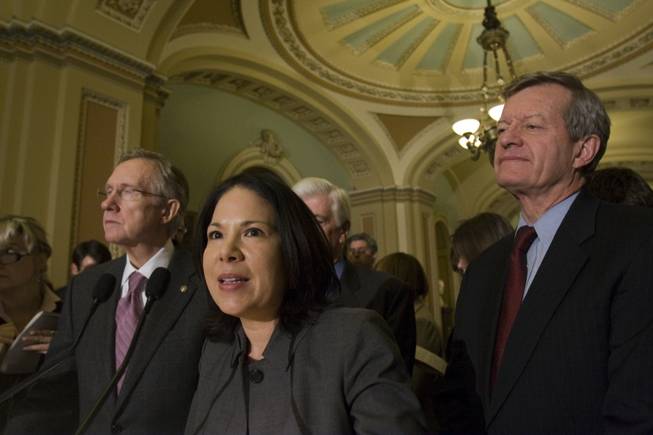
associated press file
Nancy-Ann DeParle, director of the White House Health Reform Office, with Senate Majority Leader Harry Reid, left, and Senate Finance Committee Chairman Max Baucus, speaks to reporters on Capitol Hill in October.
Sunday, Dec. 13, 2009 | 2 a.m.
Sun Archives
- A quick vote favors Harry Reid’s cause (12-11-2009)
- Reid’s mastery on display (12-10-2009)
- Compromise means ‘more choices’ for insurance (12-9-2009)
- Report: Democrats reach deal to drop government-run plan (12-8-2009)
- The skinny on the health care reform bills in each chamber of Congress (11-22-2009)
- Senate bill would cover Medicaid expansion for all states (11-19-2009)
- Long-sought , Harry Reid's goal of health care reform a step closer (11-19-2009)
- 2,074-page health bill includes surgery, payroll tax hike (11-18-2009)
- Harry Reid to present $849 billion health care bill (11-18-2009)
Sun Coverage
The White House’s top health policy adviser, Nancy-Ann DeParle, has been walking the halls of Congress since March, meeting with lawmakers one-on-one to discuss President Barack Obama’s signature domestic policy issue, health care reform.
The health czar was making progress — until July. She noticed the climate suddenly shifted. Republicans stopped taking meetings with her, she said, and canceled those that were booked.
Their offices would dial up hers to say the lawmaker “doesn’t see a need for a meeting, doesn’t have time,” DeParle recalled in an interview last week with reporters in Washington. She said several lawmakers told her they would like to work with the White House but could not break from their party.
“One took me aside this week and said, ‘Gee, looks like you’re going to be successful. I’m sorry that we didn’t work together, but I just couldn’t take it in my caucus,’ ” she said.
The lawmaker suggested that if the White House effort failed, perhaps they could work on another round. But the White House does not see a next time.
“No president will ever attempt this again,” said Dan Pfeiffer, the White House deputy communications director. The issue is too difficult and has dogged too many Democrats over the generations. “This is the last exit before the cliff.”
The latest version of the Senate health care bill includes a provocative new proposal: the ability for not-quite-senior citizens to buy insurance from Medicare — a potentially make-or-break element in a deal that has eluded the Senate for months.
Experts are split over whether this is a good idea or a dismal one, and over at The New York Times’ opinion section, the contributors at “Room for Debate” took up the question last week with zeal.
Allowing those 55 to 64 to buy into Medicare has been suggested for years, but never gained substantial traction, always put back on the shelf, as one contributor to The Times noted.
J. Michael McWilliams, an assistant professor of health care policy and medicine at Harvard Medical School and Brigham and Women’s Hospital, wrote in The New York Times that the proposal may help stem rising Medicare costs if the uninsured in that age group can get treatment for chronic conditions sooner, rather than waiting until they are 65 to qualify for Medicare.
But Stuart Butler, an adjunct professor at Georgetown University and vice president of the conservative Heritage Foundation, warns that the steep premiums, as much as $8,000 a year, would be either too costly or require such hefty government subsidies as to make the option unworkable.
DeParle explains that this proposal is not similar to those of days past. It would not allow those near-seniors to buy in to Medicare directly, but rather would set up what she calls a pre-Medicare system managed by Medicare.
The new system would have a different premium structure, with rates adjusted as needed to keep the program solvent. Provider reimbursement rates, which have raised fierce concerns from doctors as too low under Medicare, would likely be adjusted upward.
For those concerned about Medicare taking more patients at a time when it faces its own financial solvency concerns,
DeParle said the two systems would be separate.
“It won’t have access to the Medicare trust fund,” she said. “Medicare will not bear risk for this.”
She anticipated 1 million uninsured 55- to 64-year-olds would sign up for this option. Estimates are 4.3 million in that age group are uninsured, according to the Urban Institute.
Republicans scoffed at the last-minute proposal as it leaked out last week, with Republican Sen. John McCain calling it a “Hail Mary” effort by Democrats desperate to pass the bill by year’s end.
Republicans say they have participated in the talks as much as possible, reminding that Senate Majority Leader Harry Reid did much of the heavy-lifting behind closed doors. They rebut claims that they have not played well with others.
The Kaiser Family Foundation reports that polls show overwhelming support for an expansion of Medicare.
Yet whether this compromise seals the deal or is just another cliff along the Washington landscape remains to be seen.

Join the Discussion:
Check this out for a full explanation of our conversion to the LiveFyre commenting system and instructions on how to sign up for an account.
Full comments policy